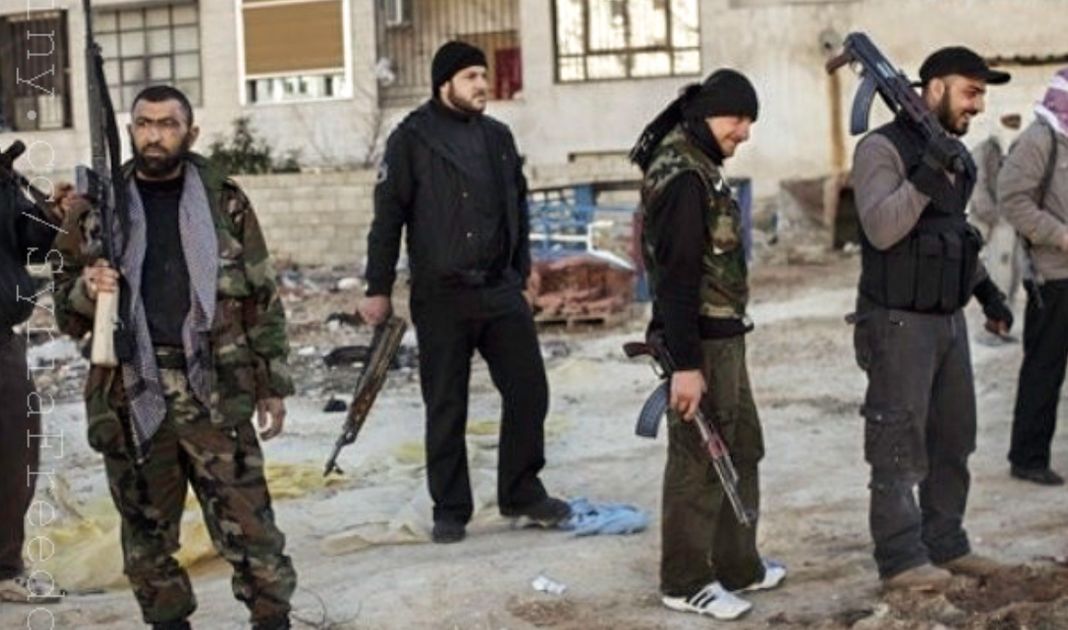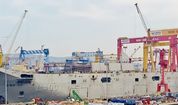The Theaters of Greco-Turkish War: a geostrategic projection. Part V

(Source: flickr.com)
The system of coalitions and the Great Power Factor
The United States
During the Cold War, Washington needed these two countries in order to contain the Soviets’ drive in the south, but since the end of the Cold War and the elimination of the “Russian threat”, all that’s left is the direct territorial, religious and military contradictions between Greece and Turkey.
Already in 1998, the Greek colonel George Bozikas wrote that the main problem that the U.S. faced was a “lack of balanced foreign policy goals [resulting] in a lack of proportionality of security assistance deliveries in both quantitative and qualitative terms. This approach has had and continues to have detrimental effects on the maintenance of a regional balance of power between Greece and Turkey in the Aegean Sea and on Cyprus.”
The presence of the U.S. troops anticipated in Athens would stop the Turkish Army from a direct attack of Greece or at least there would be preventive measures. The situation is brightly reminiscent of the Eastern European status quo, where the Baltic States and Poland consider the presence of American troops a symbolical guarantee against Russian aggression. In Alexandroupolis, the U.S. is planning to build an LNG terminal which will undermine Turkey as one of the key hubs of energy supply to Europe. Additionally, there has been news that the U.S. is considering leaving its strategic Incirlik airbase and relocating it to a Greek island, possibly Crete. Under question is the radar station in the eastern Malatya province. However, the biggest blow to U.S.-Turkey relations would be if Washington decided to relocate the 50 nuclear warheads from Incirlik to Greece. This would mean the end of the U.S. balancing between Greece and Turkey in favor of later, and the end of the Cold War in this region.
Such a move only increases the chances of war rather than its prevention. In his visit to Cyprus in October 2019, Mike Pompeo made it transparent that they are on the side of Greece, Cyprus and Israel. Turkey reacted to the idea of a military base in Alexandroupolis as a dangerous move that is determined by two considerations: to keep a military base closer to Russia and to establish a base in a sensitive area for Turkey, which is populated by the local Turkish community (a buffer zone against Turkey).
Since 2018, Athens made it a strategic priority of their diplomacy to wish for a greater U.S. presence in the country than there is now and commenced negotiations with Washington for an enhanced U.S. presence and intensification of training for Greek pilots with U.S. Combat Aviation Brigades. In October 2019, the two countries signed a Mutual Defense Cooperation Agreement and recently the Greek Parliament ratified this agreement. The deal provides for increased joint U.S.-Greece and NATO activities at Greek military bases and facilities in Larissa, Stefanovikio, and Alexandroupolis, in central and northern Greece, as well as infrastructure and other improvements at the Souda Bay U.S. naval base on the island of Crete. The U.S. Air Force is currently using American MQ-9 Reaper-type UAVs in Larissa.
France
The role of France is quite interesting, as it refuses to play a balancing role in the Aegean and openly assists and diplomatically supports Greece against Turkey. Turkey and France support the belligerent sides in Libya and it would be a perfect scenario for France if the maritime ambitions of Turkey would be undermined and the communicational line and supply chain between Libya and Turkey would be simply cut. France is a nuclear power, a permanent member of the UN Security Council and the biggest army in the European Union. This puts the issue into the broader context that France is seeking a European leadership role which would immediately create a row between Germany and France. Germany is quite reluctant in its support of Greece and it seems that Erdogan is counting on Germany, in case of war, at least that Berlin will be reluctantly participating as a member of the belligerent camp against Turkey.
France can tip the balance of military power in the war. If Turkey now has a serious military and economic superiority over Greece even the partial participation of France can alter this situation, making it uncomfortable for Turkey. French ground forces would not be engaged in case of a decision by Paris to join the war. In terms of the number of tanks and artillery systems, they are much weaker than both the Greek and Turkish ones. Ground military air defense is absolutely insignificant; now it consists only of Mistral MANPADS. There are still a few SAMR/T and “Krotal” air defense systems, but they are a part of the Air Force and are intended to protect military airfields. And it is difficult to imagine the transfer of French ground contingents to Greece.
France can become a game-changer if it is going to join the war with its naval and air forces. In terms of the number of American F-16C/D fighter-bombers, Turkey currently has an advantage over Greece (235 to 154), according to the old, but still vigorous Phantoms – 43 to 33, while Turkey also has 20 equally old ones in service, but upgraded to F-5. In addition, at least a hundred and fifty different outdated aircraft are in storage on each side, but their return to service is hardly possible. True, Greece has 42 more French Mirage-2000 fighter-bombers, to which France can add 156 similar aircraft of several modifications at once (and the French have up to 64 such aircraft in storage). This already significantly changes the balance of power, but France has 105 much more modern “Rafale-V/S”, belonging to the “4+” generation (F-16 and “Mirage-2000” – 4th generation). Even a partial use of this potential immediately tips the balance against Turkey. It may be recalled that in the only real air battle in October 1996, the Greek Mirage-2000 shot down a Turkish F-16D. The “Rafale” is obviously much better than the F-16 (with “Phantoms” belonging to the 3rd generation, it is generally meaningless to compare them). Another 43 “Rafale-M” is carried by the only French nuclear-powered aircraft carrier, the “Charles de Gaulle”.
The increasing presence of France in Lebanon is a very disturbing process for Turkey, essentially creating an isolation zone for Turkey in the Aegean to Crete and to Cyprus, and – if France manages to establish a permanent naval and military presence in Lebanon – some sort of “Anaconda doctrine” would be constructed against Turkey. This containment line is only part of the strategy, not only for France, and the next stage would be a support of the internal forces against the Erdogan regime with the exploitation of social cleavages in the country.
The Regional Coalition of Former Ottoman Territories
Egypt, Israel and Greece are all the countries which were a part of the Ottoman Empire for centuries. Like Russia, Turkey wants to restore “justice” to the cost of the former colonies and territories which now are independent countries. Neither former colonies nor Great Powers are going to allow Turkey to be more than it was allowed to be. Ankara must think twice before starting a military adventure against Greece, especially taking into account the fact that Egypt and Israel are on the side of Greece. Israel has succeeded greatly in its history and is improving relations with the Persian Gulf countries (the U.A.E., Saudi Arabia, Kuwait, etc.). In the region, the active process of conducting international agreements is being carried out, based on security guarantees or with a desire to improve relations as soon as possible.
Every country from this list (Egypt, Greece, Saudi Arabia, Kuwait, the U.A.E. and Israel) are feeling great concerns over the rise of Turkey, or I would say the “rise of Anatolia”, because the Byzantium Empire once had almost the same shape as the Ottoman Empire had. Israel feels threatened by Turkey’s aggressive support for the Palestinians and its claims on the Al-Aqsa Mosque as the main protector and guardian of this holy place. Saudi Arabia is irritated by the rhetoric of Turkey and its international strategy in the region as a genuine and true Muslim leader-country. The factor of the Muslim Brotherhood affects relations with all Arab countries except Qatar, but with Egypt, it is more than just about religion, it is about the geopolitical leadership in the region. For example, Egypt and Greece on August 6 signed the agreement demarcating the maritime border, which defines an exclusive economic zone (EEZ) between the two countries. Israel and Greece are working on the modernization of Apache helicopters with the installations of Spike NLOS missiles; the F-16 and Mirage-2000 aircraft.
It looks as if Turkey is going to further pursue a foreign policy which is drastic and belligerent to the countries, the artificial creation of the colonial powers is going to place a bet on Egypt as a country more reliable and more eager to cooperate both with the West and with the regional countries, those that are a part of the anti-Turkish coalition. The big war against Turkey and the participation of Egypt in this war would create a regional leader from this country. The Erdogan regime is not about democracy or human rights – it is about the geopolitical logic of a state which wants to behave according to its national interests. This logic states that the borders that had been established by the imperialist countries do not represent “justice” and are humiliating Turkey. Actually, the Russian Federation also pursues the same logic.
The positions of some other players.
Bulgaria would like to stay neutral during the conflict, but the two sides are trying to use Bulgaria as an instrument of deterrence. It is possible to imagine that Bulgaria will only declare war on Turkey if Ankara tries to intervene on Thrace to the regions which are populated by Muslims. Sofia has territories which are populated by Bulgarian Muslims, hence such a scenario for Sofia is undesirable. It would then be forced by circumstances to join the anti-Turkish coalition.
Pakistan and Azerbaijan actively support Turkey. In 2019, Turkey and Pakistan held military exercises in Greek territorial waters near Kastellorizo and the north of Rhodes. It was a declaration by Ankara that it has military alliances.[10] Interestingly, it is very hard to imagine that Baku officially would join as a military force on the side of Turkey because this would trigger military confrontation between Armenia and Azerbaijan.
The case of Qatar is very interesting: it would be alone and Turkey would not be able to help its ally. Only in the situation when Iran is openly supportive of Turkey would Qatar be given some security guarantees in conjunction with the pressure from the Persian Gulf countries. In Qatar there are placed American troops, thereby it is possible to imagine different scenarios, but these are beyond the remit of the current study.
Russia
The CIA during the Cold War had a tradition in its reports to dedicate some part of the research to the geopolitical implications and how the USSR would benefit from the conflict. Allow me to do the same. Even if Russia is not a secondary player in this conflict, it closely observed the Cyprus crisis in the 1960s and actually took the position which was more attractive to Turkey than to Greece. Russia can benefit from the war between Turkey and Greece, but at the same time the risks are incredible for the Russian economy and for the Russian adventure in the Middle East. Russia of course can exploit the situation in her favor:
- to undermine the Western and NATO stability in the Southern Flank;
- to prevent the incorporation of Cyprus into NATO;
- the war can create a situation when the British bases can be eliminated from Cyprus;
- Prevention of the U.S. presence in the Eastern Mediterranean (bases in Cyprus and Greek Thrace);
- To establish closer military ties with Turkey (it is unlikely the West is going to provide the weapons, material and spare parts) during the course of the war and afterwards;
- Push for the removal from the NATO of both countries and maybe trigger the process of a more active participation of PESCO as a European military factor;
- Russia would try to maintain normal relations with both Ankara and Athens;
- The war can overthrow the pro-Western regime in Greece. As well as the implications for the Erdogan regime, which can be significant and for some other anti-Turkish regimes particularly;
The risks are serious: the war can disrupt the connection between Russia and Syria and weaken its positions. According to the Montreux Convention, Turkey has the right to close the Turkish Straits. The air option will be at the table but it will not be enough for the regular needs of Russian forces in Syria. Russia would try to avoid such a scenario. It would never allow the destruction of Turkey or the creation from Turkey of a “Sick Man of Europe” again. Historically speaking, Russia can intervene if Turkey will be existentially threatened. In the 1830s, Turkey was already on the brink of its collapse because of the Egyptian military campaign. The Egyptian Army was in the midst of Anatolia but Russia intervened militarily and saved the Sultan. Egypt actually supported Greece and the Wahhabis in this period of national liberation struggle against the Ottomans.
Non-state actors and proxies
This is the most interesting element of the entire game and certain circumstances can play during the war. The only thing is that everything depends on the scale of the war. Both sides are able to use specific groups or volunteers in case of conflict, on the basis of regional and historical grievances. The Greek system of non-state actors and proxies is quite diverse, ranging from the Kurds, Armenians, Orthodox Slavic groups from Ukraine and Russia to Serbia. The recent decision of Turkey to create a mosque from Hagia Sophia put especially great pressure on the entire Orthodox community.
Turkey instead could trigger the processes which can alter the entire Middle East and maybe the entire Muslim world. It was already pointed out that Turkey presents itself as a genuine Muslim country which fights and struggles for independence from imperialist yoke. Erdogan and those who adhere to his viewpoint on the future of Islam can call to the Muslim world for support. He can eventually accuse the regimes in Saudi Arabia, the U.A.E., and Egypt of a ‘betrayal’ of Islam. Seen from the point of view of a traditional Muslim, this is actually happening. Whilst this may end up backfiring on Erdogan and his supporters, it gives him serious leverage to play with. Turkey has already been using proxies in Syria, Iran and of course in Libya. All these proxies represent a radical Muslim movement that sees Erdogan and his regime as strong supporters of Islam.
Conclusion
Turkey and Greece have a variety of different theaters of war and operation, but both sides are facing economic and geopolitical constraints which can endanger the stability in their countries. Greece is in a difficult position, if it is going to respond militarily and attack the territories of Turkey on its mainland, it would mean that the things will evolve into war on a grand scale. Turkey will retaliate against Greece by bombing its mainland and this would open the way for unrestricted and unlimited war. Such a scenario is very hard to imagine. Greece greatly elaborated its strategic prerogatives before the war: to effectively balance the Turkish armed forces with its own army; to put Turkey into confrontation with another great power in the region (in the case of France); the exploitation of EU and NATO status together with Cyprus against Turkey; building a regional coalition. The task is one to send the message to Ankara that the price for its geopolitical ambitions is going to come with grave consequences to the country.
The position of Turkey is rather more difficult, due to the geopolitical consequences. The war can put the country into full isolation and will create the second Iran-type country. All great powers are against the war in general and keener to support Greece more than Turkey. The only option which Turkey has is a limited and genius quick war against Greece in a very remote theater of operation. The danger of unification of local centers of power is much more hazardous for Turkey than the deterioration of relations with the United States. Erdogan’s Turkey is not able to survive in the current environment, if it does not alter the correlation of forces and maybe even the balance of power. The West and local center of powers would do everything in order to dismiss the regime of Erdogan and put in his place a peace-orientated representative of Turkey. The geopolitical situation in the region reminds us of the situation before WWII in terms of the process of improving relations between potential allies; active diplomatic secret negotiations; building defense alliances and the “deadlock of ambitions” when the countries are not able to retreat at the right moment, as Germany didn’t do once. It seems that Turkey is going to fall into the same trap, but the factor of Russia and China would be crucial for the future of this country.
Autor
Ridvan Bari Urcosta
Senior Analyst at Strategy&Future






Trwa ładowanie...